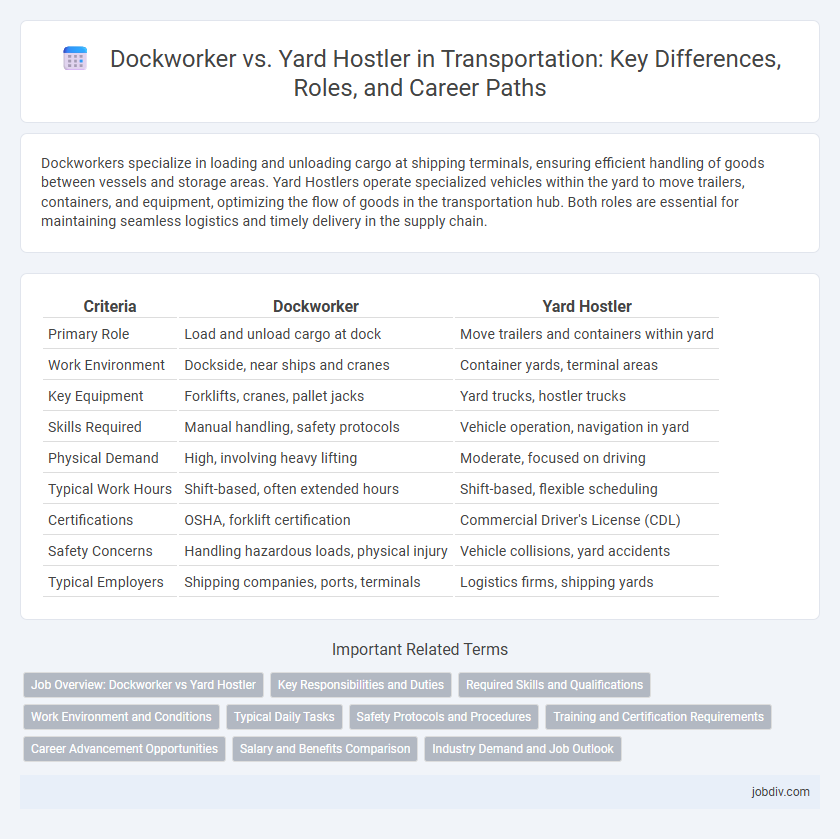Dockworkers specialize in loading and unloading cargo at shipping terminals, ensuring efficient handling of goods between vessels and storage areas. Yard Hostlers operate specialized vehicles within the yard to move trailers, containers, and equipment, optimizing the flow of goods in the transportation hub. Both roles are essential for maintaining seamless logistics and timely delivery in the supply chain.
Table of Comparison
| Criteria | Dockworker | Yard Hostler |
|---|---|---|
| Primary Role | Load and unload cargo at dock | Move trailers and containers within yard |
| Work Environment | Dockside, near ships and cranes | Container yards, terminal areas |
| Key Equipment | Forklifts, cranes, pallet jacks | Yard trucks, hostler trucks |
| Skills Required | Manual handling, safety protocols | Vehicle operation, navigation in yard |
| Physical Demand | High, involving heavy lifting | Moderate, focused on driving |
| Typical Work Hours | Shift-based, often extended hours | Shift-based, flexible scheduling |
| Certifications | OSHA, forklift certification | Commercial Driver's License (CDL) |
| Safety Concerns | Handling hazardous loads, physical injury | Vehicle collisions, yard accidents |
| Typical Employers | Shipping companies, ports, terminals | Logistics firms, shipping yards |
Job Overview: Dockworker vs Yard Hostler
Dockworkers primarily focus on loading and unloading cargo from ships, handling containers and freight at the docks to ensure efficient transfer between vessels and storage areas. Yard Hostlers operate heavy equipment such as terminal tractors to move trailers and containers within the yard, maintaining the flow of goods between storage and transportation zones. Both roles are critical in port operations, with dockworkers concentrating on cargo handling and yard hostlers managing internal yard logistics.
Key Responsibilities and Duties
Dockworkers primarily handle loading and unloading cargo, securing loads, and maintaining inventory accuracy during vessel operations. Yard Hostlers operate specialized yard trucks and equipment to move trailers and containers within rail yards or shipping terminals efficiently. Both roles require strong coordination skills, but dockworkers focus on direct cargo handling while yard hostlers ensure smooth container transfers and yard organization.
Required Skills and Qualifications
Dockworkers require physical strength, stamina, and proficiency in operating loading equipment, along with knowledge of safety protocols and cargo handling techniques. Yard Hostlers need skills in operating yard tractors, strong spatial awareness, and the ability to coordinate vehicle movements efficiently within confined spaces. Both roles demand attention to detail, communication skills, and adherence to regulatory standards in transportation logistics.
Work Environment and Conditions
Dockworkers typically operate in outdoor environments directly on the waterfront docks, exposing them to varying weather conditions, heavy machinery noise, and physical labor involving cargo loading and unloading. Yard Hostlers work primarily within container yards or terminal areas, focusing on moving trailers and containers using specialized equipment, often in a more controlled setting but with constant vehicle traffic and equipment hazards. Both roles demand adherence to strict safety protocols, yet dockworkers face more direct exposure to environmental elements compared to the relatively sheltered but traffic-intensive yard hostling tasks.
Typical Daily Tasks
Dockworkers primarily focus on loading and unloading cargo from ships, securing freight, and operating cranes and forklifts on the dock. Yard hostlers are responsible for moving trailers within the yard, positioning them for loading or unloading, and ensuring efficient trailer management using terminal tractors. Both roles require coordination to maintain smooth cargo flow and minimize turnaround times.
Safety Protocols and Procedures
Dockworkers follow strict safety protocols that include wearing personal protective equipment (PPE), adhering to load-handling procedures, and maintaining clear communication to prevent accidents during cargo operations. Yard hostlers focus on operating yard trucks and moving trailers safely by following speed limits, conducting pre-operation vehicle inspections, and using designated travel paths within the yard. Both roles require comprehensive training in hazard identification and emergency response to ensure overall workplace safety in transportation facilities.
Training and Certification Requirements
Dockworkers typically require OSHA safety training, hazardous materials handling certification, and forklift operator licenses to ensure compliance and safety during loading and unloading operations. Yard Hostlers must possess commercial driver's licenses (CDL) with endorsements for operating heavy yard trucks and often undergo specialized training on maneuvering terminal tractors within confined port environments. Both roles demand ongoing safety education but differ in certification specifics aligned with their operational responsibilities.
Career Advancement Opportunities
Dockworkers typically have career advancement opportunities through certifications in hazardous materials handling and crane operation, enabling them to ascend to supervisory or safety specialist roles. Yard Hostlers can advance by gaining expertise in specialized equipment operation and logistics coordination, often moving into yard management or fleet supervisory positions. Both roles benefit from continuous training and union membership to access higher-paying, leadership-oriented careers within port operations.
Salary and Benefits Comparison
Dockworkers typically earn higher average salaries than yard hostlers, with median annual incomes ranging from $40,000 to $65,000 depending on location and experience. Benefits for dockworkers often include union-negotiated health insurance, retirement plans, and overtime pay, while yard hostlers generally receive basic health benefits and standard hourly wages. Salary variations also reflect the physical demands and risk levels of dock work compared to the more specialized vehicle movement tasks performed by yard hostlers.
Industry Demand and Job Outlook
Dockworkers face steady industry demand driven by global trade volume and containerized cargo handling, with job outlook growth linked to port activity and automation advancements. Yard hostlers experience increasing demand in logistics hubs, fueled by the expansion of intermodal yards and distribution centers, emphasizing skills in equipment operation and safety compliance. Both roles reflect evolving transportation infrastructure needs, with technological proficiency becoming a key factor in future employment opportunities.
Dockworker vs Yard Hostler Infographic

 jobdiv.com
jobdiv.com